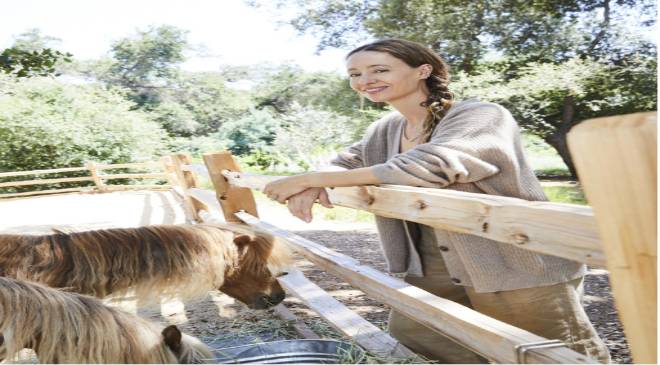“I want it all,” said Jaime Zehner, waiting for her car at the valet outside the Jenni Kayne Hillside Haven home tour in L.A.’s Brentwood neighborhood last week.
All — as in the whole seven-bedroom, nine-bathroom house decorated to showcase the Jenni Kayne brand’s growing world, from the bestselling $4,295 Pacific beds upstairs to the $3,596 flax linen Miramar chaises in the basement screening room, the cashmere sweaters, slipdresses and knot leather mules in the walk-in closet and the brand’s new Oak Essentials beauty products stocked in the bathrooms.
About 200 brand enthusiasts, dressed California casual in cashmere and jeans with Hermès or Chanel bags, paid $50 each to walk through the minimalist-yet-cozy rooms, fill out wish lists for products, get mini facials, drink rosé and leave with a bouquet of fresh flowers and a copy of Kayne’s book, “Pacific Natural at Home.”
“I want people to experience what it’s like to live the Jenni Kayne lifestyle,” the designer said of staging the $11.9 million home, newly listed by her chief executive officer Julia Hunter.
The first of its kind since the brand hired its own eight-person in-house interiors team to work on home projects, the event generated more than $200,000 in sales and will eventually lead to the sale of the home itself. Kayne’s husband, Richard Ehrlich, a real estate broker, is handling the property.
Kayne also lives in Brentwood, where on a recent afternoon her serene, modernist house was buzzing with content creation.
Wearing one of her cocoon cardigans in taupe and a matching pair of wide-legged linen pants coming out later this summer, Kayne was padding barefoot through the living room, where her own furniture is mixed with antiques and contemporary art, including a gorgeous Mary Corse painting.
In the kitchen, a chef was preparing an olive oil cake for a cookware shoot. Outside under the oak trees on a pastoral hillside that felt millions of miles away from Los Angeles, a long table was being set for an alfresco dinner party shoot, as Peanut and Jelly, two miniature rescue Shetland ponies, whinnied nearby.
The Jenni Kayne lifestyle, as it turns out, is pretty amazing.
The brand is on track to reach $140 million in sales in 2022 on the strength of its priced-right classic apparel, its fast-growing home category and its new, entry-level Oak Essentials wellness products.
The family-owned business has been restructured and renamed Pacific Group, encompassing Jenni Kayne, Jenni Kayne Home and Oak Essentials, to preserve optionality as it plots an initial public offering. (The sole investor is the designer’s father, Richard Kayne, the billionaire private equity pro whose Kayne Anderson Capital Advisors has $26 billion in assets under management.)
Kayne has also taken her first step into the hospitality sector by decorating the clubhouse, restaurant and cottages at Te Arai golf resort in New Zealand opening this fall.
“Business is growing across all categories,” said chief executive officer Julia Hunter, a veteran of J. Crew and Loeffler Randall, who expects Jenni Kayne Home will reach $100 million in sales on its own by 2024.
Oak Essentials launched in fall 2021 with five products sold individually or as a $225 skin care routine to achieve “that no-makeup glow,” and is projected to do $13 million to $15 million in sales this year, and expand into hair care and fragrance.
“It’s blowing up — 85 percent of the customers are new, meaning they have never shopped Jenni Kayne, and that’s part of the platform play we’re trying to build with the business today,” said Hunter of balancing aspirational and attainable.
While 70 percent of all sales are online, the brand is pushing to open more brick-and-mortar stores and will have 20 by year’s end. A Jenni Kayne Home store in Brentwood and Jenni Kayne apparel store in Buckhead Village in Atlanta opened in the last month, and Bethesda, Houston, Chicago and Westport, Connecticut, locations are coming next.
“All of our stores do about $2,000 per square foot in revenue, which is in line with Tiffany & Co., and ours are 1,500-square-feet boxes,” said Hunter, adding that they have an average 42 percent margin in earnings before interest, taxes, depreciation and amortization. “So our stores are pretty unique in the way they run financially because we have such a high rate of return customers. They are very local shoppers who come to us almost daily and love building their uniform at the retail stores.”
Repeat customers drive 65 percent of revenue, shopping for cashmere fisherman sweaters in multiple neutral shades of oatmeal, camel, carbon and stone, and the bestselling bouclé Brentwood chairs and ottomans. (The home line is priced from $20 to $11,795.)
Jenni Kayne Home launched a membership program in May — a $150 annual fee for 20 percent off — and has seen an average $2,500 spend from members. “It’s a huge unlock for home and it’s just scratching the service,” said Hunter. “The loyalty piece is what differentiates us long term as a business that will have high EBITDA margins and be both profitable and keep scaling.”
But it wasn’t an overnight success.
Kayne launched her label back in 2003, playing the high-end fashion game for a while in L.A. and New York but not building much of a business that way. Then, in 2008, she pivoted to uniform dressing, which coincided with the launch of her popular Rip & Tan lifestyle blog.
“She started the blog because people were always asking her everything, like what paint color to use, what doctor to call,” said Kayne’s best friend, Ali Taekman, a partner in BPCM PR who has known the designer since she was 22. “It’s her nature to be highly organized and researched so she just knows. She’s the most Virgo-ey of Virgos.”
Over the past decade, she overhauled the brand, zeroing in on bestsellers, lowering prices and expanding her offering of no-brainer lifestyle essentials, whether that be a $195 sheepskin rug or a $2,095 gold baguette signet ring.
“Our buyers sit in every meeting, and they inform the stock keeping unit plan and are very vocal about what’s working and what’s not. We also meet with store managers and our marketing team. That’s how the collection is designed. It’s not me traveling to a new destination every season and that’s what it’s about. It’s always rooted in nature and what people want from us,” said Kayne, who works with just two other designers on apparel and home, at offices in Santa Monica and downtown, which house the company’s 171 employees.
Certainly, in certain upscale neighborhoods in L.A., Amagansett and elsewhere, Jenni Kayne has become part of the everyday.
“Jenni has done an exceptional job of defining daily essentials and delivering collections that are both timeless and on-trend,” said Gregg Renfrew, founder of the Santa Monica-based Beautycounter.
Apparel is priced from $65 to $595 for boy blazers, cashmere knits, silk and flannel shirts, slipdresses, swimwear and more, with fine jewelry priced higher.
All of the core product comes in sizes XS to 3X. “We’re moving more in that direction, and we’ve incorporated it in our imagery,” Hunter said of size-inclusivity. “So far, it’s been working.”
In recent years Jenni Kayne has gone from 10,000 active customers to 180,000 active customers, meaning those who has shopped in the last 12 months. Instagram and Facebook still represent the biggest customer acquisition spend, but the brand has also seen success with catalogues and TikTok.
“We weren’t sure about it at first, but it’s growing faster than anything else. People are coming to our content for home then shopping all the different brands,” said the executive.
There’s a wealth of it generated from home projects like Hillside Haven in L.A. and The Ranch, a four-bedroom, 3,860-square-foot house north of L.A. in Santa Ynez, which the Jenni Kayne interiors team took down to the studs and spent the last two years renovating.
“It feels like a baby version of Napa. It’s a little farm-y, the olive oil and wine feels special, the restaurants are great, my godmother owned a ranch just up the road for 30 years, so I’ve been going my whole life,” said Kayne, who not only stocked the house with her brand items but curated other favorites, including Daily Harvest smoothies in the freezer, locally produced Wilder Gin in the bar and SuperGoop sunscreen by the pool.
“The buzz we’ve been getting around home projects…is building on top of funnel brand awareness. We’re getting a bigger audience, then people are converting to shopping every category,” said Hunter, explaining that the house’s partner brands Portola, Waterworks and Plain English Kitchens post on their own social channels as well.
“It’s the chair or sofa you don’t get sick of because it was a trend from five years ago, that are made of high-quality materials but not overdesigned,” said Jackie Beyer, general manager of Jenni Kayne Home, describing the brand’s Pacific Natural aesthetic, which has led to customers purchasing entire rooms. “You can have fun with art and flowers, but Jenni believes in keeping the foundation grounded and neutral — though we are expanding the color offering in a lot of our styles so it’s not that we are saying everything has to be beige and white.”
The Ranch is by invitation only for influencers and friends of the brand, and will soon be put on the market by Ehrlich.
“People are talking about experiences on the public market, Restoration Hardware is doing planes and restaurants and a yacht. The Ranch is not open to the public, but on social media we are showing everyone, not just the Kendall Jenners of the world, though that’s great, too,” Hunter said.
Before and after videos of the homes have been effective marketing tools, said Beyer, who would like to have the next Jenni Kayne home project in upstate New York. “We know we have the California audience and we have a great customer base in New York, it’s a huge part of our business. But building press awareness there would be good for us, too. (The business is 30 percent California, 25 percent New York, and 45 percent the rest.)
While the bulk of apparel is made in China, the brand is producing almost all of its furniture domestically in California, Oregon and North Carolina, to manage its inventory position.
Next up, the company is eyeing a move into hospitality, taking its first steps in New Zealand, where Kayne did the interiors for a resort property owned by her family. “That is a big push for us later this year,” said Hunter. “We’ve been talking about Jenni Kayne Experiences as a concept,” she said of what could be a fourth pillar of the business, incorporating hotels, spas and perhaps even food and beverage.
The Jenni Kayne lifestyle could also work on TV, perhaps as a Pacific Natural version of Magnolia network.
“We were out talking to a bunch of different networks and got pretty serious, but we think we make pretty good content ourselves, and we haven’t found anyone we trust yet,” said Hunter. “But we are open to a partnership because it would be huge for awareness for the company and pre-IPO would make sense timing wise.”
“Jenni is reticent to jump in front of a camera, that’s not her style,” said Taekman of her friend. “But she’s been gently pushed and she knows if she has put this much work into it, she should do it. She has an understanding of what’s good for the brand.”
“I’m pretty private,” the designer agreed, when asked about the growing spotlight. “The other day when I was picking up a cake with my daughter, this girl followed me home. That’s weird to me! But my goal is for women to love what they are wearing, sitting on and putting on their face, so it’s also amazing.”























